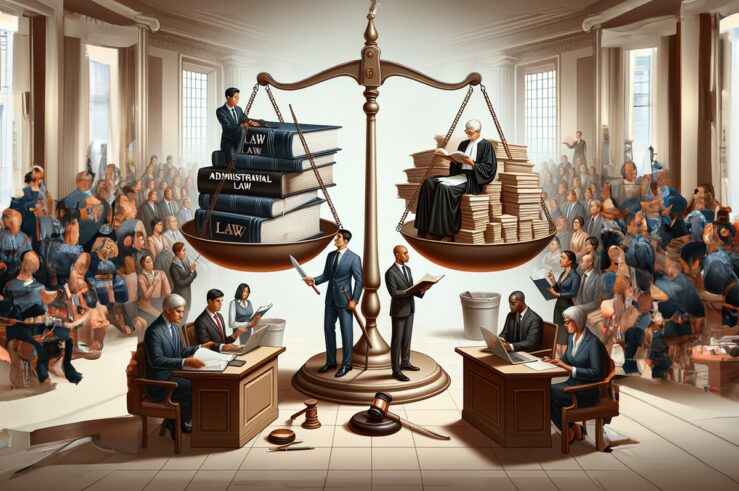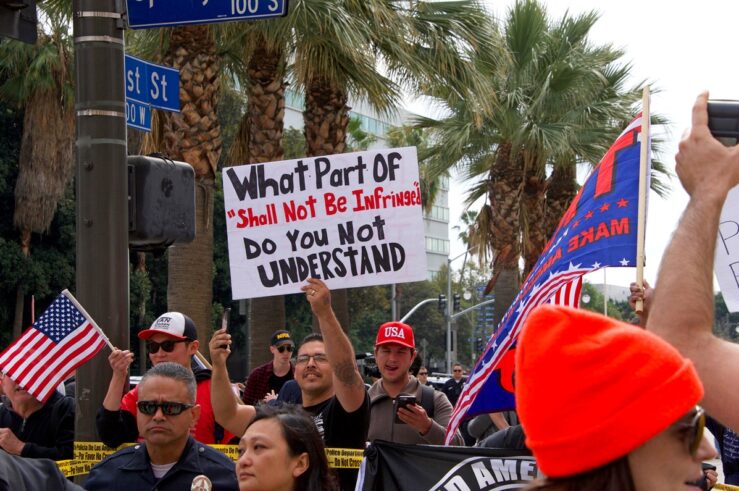FTC Alumni Response to FTC/DOJ RFI on Serial Acquisitions
As former antitrust enforcers and alumni of the Federal Trade Commission (FTC), we are pleased to submit these comments to the FTC and U.S. Justice Department’s (DOJ) Antitrust Division (DOJ) in response to your Request for Information on Corporate Consolidation Through Serial Acquisitions and Roll-Up Strategies (RFI). We have devoted significant portions of our careers ... FTC Alumni Response to FTC/DOJ RFI on Serial Acquisitions
An Equilibrium-Adjustment Theory of Current Trends in Administrative Law
This essay began as a response to claims that the argument that Chevron encourages congressional inaction has been refuted by the best available evidence. That Chevron causes such inaction is one of the arguments made by petitioners in Loper Bright. Leading scholars reject the argument. For instance, Chris Walker has called it one of the ... An Equilibrium-Adjustment Theory of Current Trends in Administrative Law
Vullo and the Dangers of Government Coercion Over Speech
The U.S. Supreme Court delivered a major victory for free speech and struck a blow against government censorship-by-proxy yesterday in NRA v. Vullo: “Government officials cannot attempt to coerce private parties in order to punish or suppress views that the government disfavors.” This is a major decision, and will have implications for free speech online, ... Vullo and the Dangers of Government Coercion Over Speech
Will the FTC Reinvigorate an Antiquated Law that Raises Prices?
The Federal Trade Commission (FTC) and Congress are showing renewed interest in a Great Depression-era law, the Robinson-Patman Act, that discourages sales discounts. This is bad news for hard-strapped American consumers, who have had to cope with prices that have risen more than 20% since February 2020. As such, reinvigorated enforcement of the RPA, a ... Will the FTC Reinvigorate an Antiquated Law that Raises Prices?
Should the Federal Government Regulate Artificial Intelligence?
Artificial intelligence is in the public-policy spotlight. In October 2023, the Biden administration issued its Presidential Executive Order on AI, which directed federal agencies to cooperate in protecting the public from potential AI-related harms. President Joe Biden said in his March 2024 State of the Union Address that government enforcers will crack down on the ... Should the Federal Government Regulate Artificial Intelligence?
Live Nation Breakup: Are Mergers Really to Blame for Ticketmaster’s Problems?
The U.S. Justice Department (DOJ) announced yesterday that it has filed suit, along with 29 states and the District of Columbia, charging Live Nation Entertainment Inc. and its subsidiary Ticketmaster LLC with monopolizing the live-events industry in violation of Section 2 of the Sherman Act. The suit, filed in the U.S. District Court for the ... Live Nation Breakup: Are Mergers Really to Blame for Ticketmaster’s Problems?
All Roads Lead to Dallas: FTC Non-Compete Rule Set to Face Its First Legal Test in the Northern District of Texas
The sweeping prohibition on noncompete agreements promulgated by the Federal Trade Commision (FTC)—which would nullify 30 million contracts and preempt the laws of 46 states if it takes effect, as scheduled, on Sept. 4—is set for its first judicial test. In Ryan, LLC v. FTC, Judge Ada Brown of the U.S. District Court for the ... All Roads Lead to Dallas: FTC Non-Compete Rule Set to Face Its First Legal Test in the Northern District of Texas
AI Partnerships and Competition: Much Ado About Nothing?
Competition policymakers around the world have been expressing concerns about competition in emerging artificial-intelligence (AI) industries, with some taking steps to investigate them further. These fears are notably fueled by a sense that incumbent (albeit, in adjacent markets) digital platforms may use strategic partnerships with AI firms to stave off competition from this fast-growing field. ... AI Partnerships and Competition: Much Ado About Nothing?
How Should We Measure Competition?
Competition is the driving force behind the success of markets. It’s hard to imagine a thriving market economy without the presence of competitive forces. But how do we actually measure competition? I use the term all the time, but do we actually have a measure of it? This question is more complex than it may ... How Should We Measure Competition?
Google Previews the Coming Tussle Between GDPR and DMA Article 6(11)
Among the less-discussed requirements of the European Union’s Digital Markets Act (DMA) is the data-sharing obligation created by Article 6(11). This provision requires firms designated under the law as “gatekeepers” to share “ranking, query, click and view data” with third-party online search engines, while ensuring that any personal data is anonymized. Given how restrictively the ... Google Previews the Coming Tussle Between GDPR and DMA Article 6(11)
ICLE/ITIF Amicus Brief Urges Court to Set Aside FCC’s Digital-Discrimination Rules
The Federal Communications Commission (FCC) recently adopted sweeping new rules designed to prevent so-called “digital discrimination” in the deployment, access, and adoption of broadband internet services. But an amicus brief filed by the International Center for Law & Economics (ICLE) and the Information Technology & Innovation Foundation (ITIF) with the 8th U.S. Circuit Court of ... ICLE/ITIF Amicus Brief Urges Court to Set Aside FCC’s Digital-Discrimination Rules
What We Know About the Rise in Markups
In my research and newsletters, I’ve written about how to interpret markups—mostly on the theory side. I haven’t devoted much space explaining the empirics. How high are markups in the United States? Are they rising? If so, by how much? This post seeks to answer those questions. I’m writing it after reading a new paper ... What We Know About the Rise in Markups
















